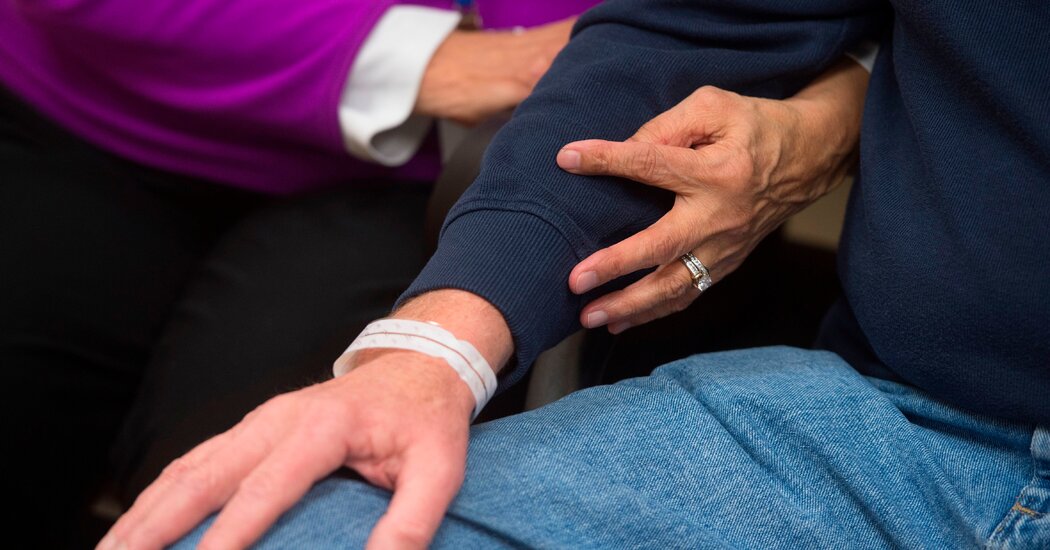
One day years ago, during her training in neurology, Dr. Corinna Seliger-Behme met a man with end-stage bladder cancer. Before the diagnosis, the man had a stable family and job, and no history of mental health problems, Dr. Seliger-Behme recalled. But, soon after learning of his terminal disease, he tried to kill himself with a knife in the bathtub. He spent the last week of his life in the psychiatric ward.
That patient’s situation was extreme, but the psychological distress brought on by cancer is significant for many patients. Two studies published on Monday quantify the psychological burden of cancer in fine detail, pulling from much larger data sets than previous research. The findings make a compelling case for oncologists to have more discussions with their patients about mental health struggles.
“Probably, we can prevent suicide if we talk about it, and if we really start that early,” said Dr. Seliger-Behme, a neurologist at Heidelberg University in Germany.
In one of the new reports, she and several colleagues reviewed 28 studies that included more than 22 million cancer patients across the world. Their analysis showed that the suicide rate was 85 percent higher for people with cancer than the general population. Predictably, cancers with the best prognoses — including prostate, nonmetastatic melanoma and testicular cancers — had the lowest suicide rates, whereas those with the worst prognoses, like stomach and pancreatic cancers, had the highest suicide rates.
Suicide rates among people with cancer were notably higher in the United States than in Europe, Asia or Australia, the study found. The authors speculated that the high cost of health care in the United States might have led some patients to forgo treatment to avoid bankrupting their families. They also wondered if easier access to firearms in the United States compared to countries in other world regions could have contributed to the higher suicide rates.
In the second new study, Alvina Lai, who studies informatics at University College London, and a colleague created a large database, gleaned from the health records of about 460,000 people with 26 different cancers who were diagnosed between 1998 and 2020 in Britain.
Five percent of patients were diagnosed with depression after their cancer diagnoses, and the same was true for anxiety. About one percent of the group had self-harmed after their diagnoses. Patients with brain tumors, prostate cancer, Hodgkin’s lymphoma, testicular cancer and melanoma were most likely to hurt themselves.
About one-quarter of the cancer patients had substance abuse disorder, the study found. And psychiatric issues, including substance abuse, tended to increase over time, even years after a diagnosis.
The analysis showed that the single biggest risk factor for developing a mental health condition was treatment involving surgery, radiation and chemotherapy. The length, intensity and cumulative side effects of this triple-threat approach to cancer treatment could explain why it triggers depression, anxiety and even personality disorders in many people.
Chemotherapy on its own was also tied to high rates of psychiatric disorders, whereas “kinase inhibitors” — targeted drugs that often have fewer side effects — had the lowest rates.
The stark data made Dr. Lai wonder whether patients are given enough opportunities to weigh the psychological risks of potential treatments. “It would be so useful for cancer patients who are newly diagnosed to see what the data tell us and make an informed decision,” Dr. Lai said.
The study also yielded some surprising findings. For example, testicular cancer carried a higher risk of depression than any other cancer type, affecting 98 of every 100 patients.
“That’s slightly counterintuitive — it’s one of the better prognosis forms of cancer,” said Dr. Alan Valentine, chair of the psychiatry department at M.D. Anderson Cancer Center in Houston, who was not involved with the study. The finding, he said, underscores how tumultuous a diagnosis can be even when a tumor doesn’t cut life short.
New Developments in Cancer Research
Progress in the field. In recent years, advancements in research have changed the way cancer is treated. Here are some recent updates:
Because studies assessing mental health are typically based on questionnaires that rely on self-reporting, the data probably underrepresents reality, noted Wendy Balliet, a clinical psychologist at the Hollings Cancer Center at the Medical University of South Carolina in Charleston. Persistent stigmas against psychiatric disorders mean that people may not be forthcoming about their internal struggles, Dr. Balliet said. She also noted that the complexities involved in declaring a death as a completed suicide may also lead to underreporting of the connection between cancer and fatal self-harm.
The results raise questions about how much more counseling and support patients could be given along the way. “It’s hard for me to not to think about what conversations these patients are having with their oncologists,” Dr. Balliet said.
The studies also draw attention to cancer patients with previously diagnosed psychiatric disorders, such as schizophrenia. Previous research has found that such patients die from cancer at higher rates than those without these conditions. Dr. Lai’s study found that cancer patients with schizophrenia were more likely to receive palliative care, potentially indicating that they didn’t get the treatment they needed early on in their diagnoses.
“Cancer is an expensive disease,” said Dr. Valentine of M.D. Anderson, “and you could argue that folks with severe mental disorders either don’t have access to care or are in a health care system that doesn’t have the resources they need.”
Current treatment guidelines suggest screening for depression as part of routine cancer care, noted Dr. Nathalie Moise, professor of medicine at Columbia University’s Vagelos College of Physicians and Surgeons. “I think these findings may support the need to also screen for suicide and other risk factors,” she said.
“Normalizing mental health treatment as an integral component of your overall cancer care may also go a long way,” she said.
If you are having thoughts of suicide, call the National Suicide Prevention Lifeline at 800-273-8255 (TALK) or go to SpeakingOfSuicide.com/resources for a list of additional resources.




